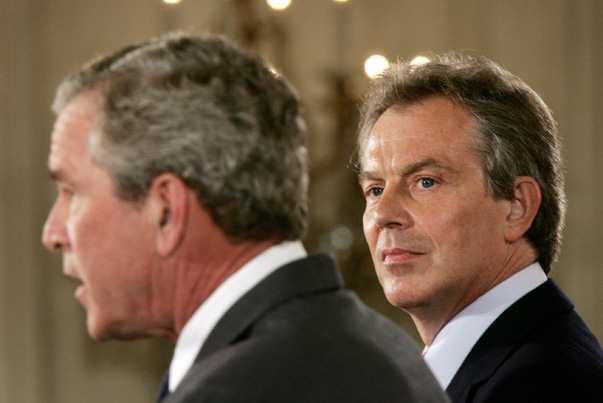Correspondence between Tony Blair and President George W Bush has been published for the first time today as part of the Chilcot Inquiry.
The letters can be read in full here. They give us a fascinating insight into the countdown to the invasion of Iraq and the relationship between Downing Street and the White House.
The letters cover the period from the immediate aftermath of the September 11, 2001 attacks on the US to 2007, when a sectarian civil war between Sunni and Shia was raging in Iraq.

‘Get Saddam out’
Mr Blair was discussing the possibility of ousting Iraqi dictator Saddam Hussein as early as 11 October 2001.

Later in the same memo, he wrote: “I have no doubt we need to deal with Saddam” and: “I am sure we can devise a strategy for Saddam deliverable at a later date.”
He was using the phrase “regime change” in relation to Iraq as early as December 2001, in a note on the coalition’s progress in toppling the Taliban in Afghanistan.

Mr Blair wrote: “We shall have given regime change a good name, which will help us in the argument over Iraq.”
‘Tenuous’ link to al-Qaeda
In the same December 2001 note, Mr Blair admitted the link between the Saddam regime and al-Qaeda was “at best very tenuous”.

But in a 2002 memo to Mr Bush, he appeared to suggest playing on the threat from al-Qaeda to win more public support for military action.
Mr Blair said Britain and America should “recapitulate all the WMD evidence; add his attempts to secure nuclear capability; and, as seems possible, add on the al-Qaeda link, it will be hugely persuasive over here”.
The Chilcot inquiry found that the intelligence case for Saddam potentially supplying terror groups with weapons of mass destruction was consistently weak.
Mr Blair was in fact warned that military action would increase the threat from al-Qaeda to the UK.

‘I will be with you, whatever.’
On July 28, 2002, Mr Blair began a note to Mr Bush with this now-notorious phrase.

Historians will argue about exactly what Mr Blair meant by this phrase.
But we know that Sir David Manning, then Britain’s ambassador to the US, told the Chilcot Inquiry he tried to persuade the Prime Minister to take that opening sentence out of the note.
Sir David said: “It was too sweeping. It seemed to me to close off options, and I didn’t see that that was a sensible place to be.”
Mr Blair’s chief of staff Jonathan Powell also disliked the phrase, but Mr Blair insisted on keeping it in the memo.
The Palestine question
From his first post-9/11 strategy note to Mr Bush, Tony Blair was pushing for a new effort to solve the Israel/Palestine conflict.
He returned to the Middle East Peace Process repeatedly in subsequent letters, apologising for being “a bore” on the subject.
Mr Blair felt making progress on a two-state solution for Palestine would have a “massive impact” on public opinion in the wider region.

‘Perfectly capable… of killing each other’
It has also been Mr Blair’s case that he could not have known in advance how difficult it would prove to pacify Iraq after the fall of Saddam.
But in a note written before the invasion, he sets out the scale of the potential problem in no uncertain terms.
“The biggest risk we face is internecine fighting between all the rival groups, religions, tribes, etc. in Iraq when the military strike destabilises the regime,” he wrote.

Mr Blair added that the Iraqis were “perfectly capable, on previous form, of killing each other in large numbers”.
‘The true post-cold war world order’
In the opening days of the war, on 20 March 2003, Mr Blair set out his vision for what was really at stake: the creation of a “true post-cold war world order”.

Mr Blair wrote: “Our fundamental goal is to spread our values of freedom, democracy, tolerance and the rule of law, but we need a broad based agenda capable of unifying the world to get it.
“That’s why, although Iraq’s WMD is the immediate justification for action, ridding Iraq of Saddam is the real prize.”
‘Lone voices’
By May 2007, shortly before he stepped down as Prime Minister, Mr Blair’s tone was much less optimistic.
He told Mr Bush he feared they had become “lone voices” on the need for continued Western involvement in Iraq, with newer politicians keen to distance themselves from the past.
Mr Blair wrote: “Everywhere in the region at present, we are pinned back. We remain strong. We are not losing. But we are not really able to move forward.”
Islamic extremists had a “coherent political strategy for Iraq”, Mr Blair said, whereas “our problem is that we don’t”.



